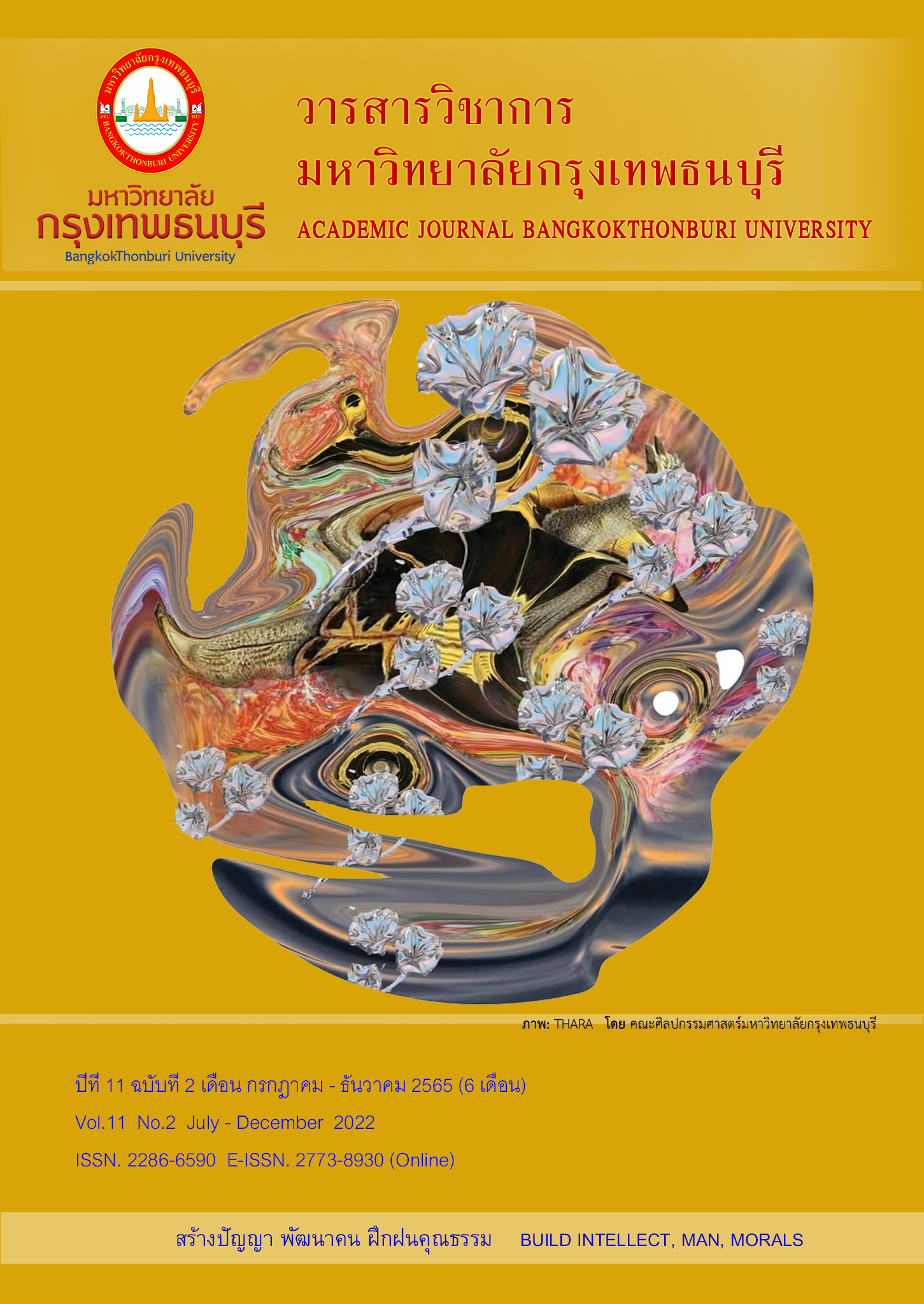Factors Affecting Logistics Management for Economic and Environmental Development in Thailand
Main Article Content
Abstract
The study titled "Factors Affecting Logistics Management for Economic and Environmental Development in Thailand." The objectives of this study were to study general information, the level of factors, direct and indirect influences, and logistics management guidance for economic and environmental development in Bangkok and its vicinity. The sample group consisted of 400 people. The statistics applied were the analysis of measurement models and structural equation modeling. The research results revealed that the knowledge factor for those involved in logistics is logistics that facilitate convenience for consumers. The factor of economic and environmental attitude is that everyone is responsible for environmental protection. Regarding the perception of economic and environmental information, that is, feeling anxious about the dire economic and environmental situation. Regarding the perception of economic and environmental information, that is, feeling worried about the dire economic and environmental situations, The hypothesis testing results revealed that c2/df = 0.52, SRMR = 0.05, CFI = 0.92, NFI = 0.91, TLI = 0.96, GFI = 0.92, and RMSEA = 0.04. There were statistically significant coefficients. The research recommendation is that good logistics management should be based on a practical and up-to-date operational approach. The research suggests that good logistics management should be based on a practical and up-to-date operational approach, reusing logistics resources in a cost-effective way, reducing waste, improving all processes, encouraging consumption that is good for the environment, creating a network that links, and putting into place practices that are fully compatible and sustainable.
Article Details

This work is licensed under a Creative Commons Attribution-NonCommercial-NoDerivatives 4.0 International License.
References
กระทรวงพาณิชย์. (2562). ดัชนีราคาส่งออก-นำเข้าของประเทศ เดือนกุมภาพันธ์ 2562. กองดัชนีเศรษฐกิจการค้า สำนักงานนโยบายและยุทธศาสตร์การค้า กระทรวงพาณิชย์กระทรวงทรัพยากรและสิ่งแวดล้อม.
กองยุทธศาสตร์การพัฒนาระบบโลจิสติกส์. (2563). แผนยุทธศาสตร์การพัฒนาระบบโลจิสติกส์ ของประเทศไทย ฉบับที่ 3 (พ.ศ. 2560-2564). กรุงเทพมหานคร: สำนักงานคณะกรรมการพัฒนาการเศรษฐกิจและสังคมแห่งชาติ.
กฤติยา เกิดผล และ ปรัชภรณ์ เศรษฐเสถียร. (2560). การพัฒนาระบบบริหารจัดการด้านโลจิสติกส์โซ่อุปทานการท่องเที่ยว ในจังหวัดจันทบุรี. คณะเทคโนโลยีอุตสาหกรรม
ณัชพล จรูญพิพัฒน์กุล. (2561). FAQ ISSUE 134 ตีแผ่โครงสร้างระบบโลจิสติกส์ไทย. ธนาคารแห่งประเทศไทย. สืบค้น 30 มกราคม 2563, จาก https://www.bot.or.th/Thai/Monetary Policy/ArticleAndResearch/FAQ/FAQ_134.pdf
เตชะ บุญชัย. (2553). สาระน่ารู้เกี่ยวกับกรีนโลจิสติกส์ สำหรับภาคธุรกิจ. กรุงเทพมหานคร: โรงพิมพ์คลังนานาวิทยา.
ทวีศักดิ์ เทพพิทักษ์. (2554). โลจิสติกส์เพื่อสิ่งแวดล้อม. Logistics 2 Days. สืบค้น 30 มกราคม 2563, จาก http://www.logistics2day.com/app_website/community//blog. aspx?id=705
บุญยิ่ง คงอาชาภัทร. (2563). เผยทัศนคติ-พฤติกรรมคนไทยต่อสิ่งแวดล้อม ‘ปัญหาขยะพลาสติก’ครองแชมป์!. ค้นเมื่อ 20 กุมภาพันธ์ 2563, จากhttps://mgronline.com/greeninnovation/detail/9630000004144
วลัยลักษณ์ อัตธีรวงศ์ และวริยา ปานปรุง. (2559). แรงขับเคลื่อนในการประยุกต์ใช้การจัดการโลจิสติกส์สีเขียวสำหรับผู้ประกอบการหนึ่งตำบลหนึ่งผลิตภัณฑ์. วารสารวิทยาศาสตร์และเทคโนโลยี, 24(2), 225-239.
มูลนิธิสถาบันสิ่งแวดล้อมไทย. (2557). ธุรกิจสีเขียว. สืบค้น 20 กุมภาพันธ์ 2563, จาก http://www.tei.or.th/publications/2014-download/2014-TBCSD-Greenbusiness-y8-2.pdf
มูลนิธิสถาบันสิ่งแวดล้อมไทย. (2562). สผ. ร่วมกับ มูลนิธิสถาบันสิ่งแวดล้อมไทย นำเสนอร่างรายงานสถานการณ์คุณภาพสิ่งแวดล้อม พ.ศ. 2562 ชี้มี 4 ประเด็นต้องเร่งแก้ไขโดยด่วน. สืบค้น 30 มกราคม 2563, จากhttp://www.tei.or.th/th/highlight_detail.php?event_id=410.
สิรางค์ กลั่นคำสอน ธีรนันทา ฤทธิ์มณี วิชัย รุ่งเรืองอนันต์ เจริญชัย โขมพัตราภรณ์ และยอดมนี เทพานนท์. (2555). การจัดการระบบโลจิสติกส์แบบย้อนกลับและกรีนโลจิสติกส์ของอุตสาหกรรมแปรรูปโลหะ. สํานักงานกองทุนสนับสนุนการวิจัย.
สุธิดา ทับทิมศรี. (2558). การบริหารจัดการโลจิสติกส์เพื่อสิ่งแวดล้อม. สืบค้น 20 กุมภาพันธ์ 2563, จาก https://research.kpru.ac.th/sac/fileconference/8622018-05-04.pdf
ศูนย์วิจัยกสิกรไทย. (2560). E-commerce แรงไม่ตก ดันโลจิสติกส์โต. สืบค้น 30 มกราคม 2563, จาก https://www.kasikornbank.com/th/business/sme/KSMEKnowledge/article/KSMEAnalysis/Documents/E-Commerce_Logistic.pdf.
อรรถพล ธรรมไพบูลย์ นุช สัทธาฉัตรมงคล และลาวรรณ์ อนันต์ชลาลัย. (2559). การรับรู้เกี่ยวกับการจัดการโซ่อุปทานสีเขียวและผลกระทบต่อภาพลักษณ์องค์กร. วารสารธุรกิจปริทัศน์, 8(2),109-128.
อดุลย์ จาตุรงคกุล และดลยา จาตุรงคกุล. (2550). พฤติกรรมผู้บริโภค (พิมพ์ครั้งที่ 8). กรุงเทพมหานคร: โรงพิมพ์มหาวิทยาลัยธรรมศาสตร์.
Anbuudayasankar, S. P., Ganesh. K, & Mohapatra, S. (2014). Models for Practical Routing Problems in Logistics: Design and Practices. Switzerland: Springer.
Arnab., B., & Sameer., B. (2022). Impact of COVID-19 on ports, multimodal logistics and transport sector in India: Responses and policy imperatives. Transport Policy, https://doi.org/10.1016/j.tranpol.2022.10.014.
Field, A.2005) ). Discovering statistics using SPSS (2nd ed.). London: Sage.
Henriette, B. D., & Dorthe, B. (2012). Value-Added Logistics in Supply Chain Management. Academica: Copenhagen.
Hu, L., & Bentler, P. (1998). Fit Indices in Covariance Structure modeling: Sensitivity to under parameterized model misspecification. Psychological Methods, 3, 424-453.
Khan, S. A. R. (2019). The Effect of Green Logistics on Economic growth, Social and Environmental Sustainability: An Empirical Study of Developing Countries in Asia. Preprints 2019, 2019010104 (doi: 10.20944/preprints201901.0104.v1
Kunert, C. (2018). Design for stability in transport Logistics-Definition concepts and evaluation. Germany: KIT Scientific Publishing.
Noruzi, A. T. (2016). Green Logistics. A critical view of the environmentally-friendly measures in the transport and logistics sector. Mexico: GRIN Verlag.
Nunnally, J. C. (1978). Psychometric theory (2nd ed.). New York: McGraw-Hill.
Sarkis, J. & Dou, Y. (2017). Green Supply Chain Management: A Concise introduction. UK: Routledge.
Song, M. & Lee H., (2022). The relationship between international trade and logistics performance: A focus on the South Korean industrial sector. Research in Transportation Business & Management, Volume 44, 2022,100786,ISSN 2210-5395, https://doi.org/10.1016/j.rtbm.2022.100786.


